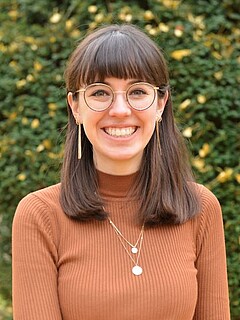PhD students 3rd cohort

Sophie Lauster, M.A.
sophie.lauster@uni-jena.de
Curriculum Vitae
2015-2019 Bachelor of Arts in English and German Language and Literature at the University of Heidelberg and the University of Durham (U.K.)
2017 Internships in the Department of Literary Museums, Archives and Memorial Sites in Baden-Wuerttemberg at the German Literary Archives in Marbach (DLA) and in the Department of Education at the Klassik Stiftung Weimar
2017-2019 Student Tutor for the Introduction to Medieval Studies and the Introduction to Literature at the German Department at the University of Heidelberg
2019 Student Assistant at the German Department at the University of Heidelberg (Chair for “19th Century and Modernity”, Prof. Dr. Barbara Beßlich)
2019-2020 Master of Studies in Modern Languages (German) at the University of Oxford
2019-2021 Scholarship Holder of the German Academic Scholarship Foundation (Studienstiftung des Deutschen Volkes)
2019-2021 Master of Arts in German and English Literature at the University of Heidelberg
Since Oktober 2021 PhD student and research associate at the Research Training Group “The Romantic Model”
April-June 2023 Hospitantin am Freien Deutschen Hochstift für die Wechselausstellung des Deutschen Romantik-Museums in Frankfurt a.M. „‚Die Natur will, dass Kinder Kinder sind…‘. Kindheit im Wandel: Von der Aufklärung zur Romantik“ (27.10.23-21.01.24)
PhD project
The Dark Side of Modernity – Adaptations of Dark Romanticism and the Gothic in German Literature of the Early 20th Century (Arthur Schnitzler – Alfred Döblin – Leo Perutz)
My PhD project focusses on the aftermath of Dark Romanticism (Schwarze Romantik) and the Gothic in German narrative literature of the early 20th century. In the first part, the German ‘Schwarze Romantik’ is approached from the perspective of a history of problems (‘Problemgeschichte’). Using exemplary texts by E.T.A. Hoffmann, it is determined which formal and structural elements are used in narratives of historical Dark Romanticism to respond to which problems. Based on this, the second part analyses different manifestations of Dark Romanticism and the Gothic in selected works by Alfred Döblin, Arthur Schnitzler and Leo Perutz. In this way, the dissertation expands research on the individual authors by highlighting previously neglected elements of the Gothic and examining texts that have hardly been studied. Overall, the dissertation aims to contribute to the systematic recording of the aftermath of (Dark) Romanticism in the context of the Research Training Group.
Analysed Texts:
- Arthur Schnitzler: Die Weissagung (1905), Das Tagebuch der Redegonda (1911), Traumnovelle (1925/26)
- Alfred Döblin: Die Segelfahrt (1910/11), Die Helferin (1911), Ritter Blaubart (1911), Die Nachtwandlerin (1911)
- Leo Perutz: Die Galerie des Grafen Gollenhaidt (1905/6), Der Mond lacht (1909/15/30), Der Meister des jüngsten Tags (1923), St. Petri-Schnee (1933)
Publications
Kleinere Beiträge
- Lernen mit Bildern. Johann Bernhard Basedows ‚Elementarwerk für die Jugend‘. In: Seng, Joachim / Kaluga, Katja (Hrsg.): „Die Natur will, dass Kinder Kinder sind…“. Kindheit im Wandel: Von der Aufklärung zur Romantik. Göttingen 2023, S. 60f.
- Religion als Weltzugang. Johann Sigmund Stoys ‚Bilder-Akademie für die Jugend‘. In: Seng, Joachim / Kaluga, Katja (Hrsg.): „Die Natur will, dass Kinder Kinder sind…“. Kindheit im Wandel: Von der Aufklärung zur Romantik. Göttingen 2023, S. 80f.
- Vordenker von Transhumanismus und KI? Zur Jubiläumsausstellung „Unheimlich Fantastisch – E. T. A. Hoffmann 2022“ im Deutschen Romantik-Museum in Frankfurt am Main. Gestern | Romantik | Heute, 31.01.2023.
- with Tabea Lamberti: Zwischen Geisterbahnfahrt und Schauerromantik – "Der Sandmann" am Bamberger ETA Hoffmann Theater. Gestern | Romantik | Heute, 14.04.2022.
Presentations
Presentations
- „[D]er Einbruch der E. T. A. Hoffmannschen Welt“ – Transformationen des Schwarzromantischen in Leo Perutz’ Erzählung ‚Der Mond lacht‘ (1915/1930). Nachwuchs-Forschungskolloquium für E. T. A. Hoffmann-Forscher:innen. Online, 14.04.2023.
- Genderfluid Vampires – Gothic Explorations of Threats and Possibilities Posed by Changing Gender Conceptions in Alfred Döblin’s "The Helper" ("Die Helferin", 1911). Gothic Interruptions. The 16th International Gothic Association Conference. Trinity College Dublin, 29.07.2022.
Moderations
- Lesungsmoderation und Gespräch mit der Autorin Asal Dardan über ihre Essay-Sammlung ‚Betrachtungen einer Barbarin‘ (2021), Abendveranstaltung im Rahmen des Workshops „Ironie | Post-Ironie in der Gegenwart“ an der Friedrich-Schiller-Universität Jena, gemeinsam mit Marie Jonietz, 25.01.2023.
- Podiumsgespräch mit der Dramaturgin Petra Schiller zur Inszenierung "Der Sandmann" am ETA Hoffmann Theater Bamberg, gemeinsam mit Tabea Lamberti, 23.03.2022.
- Lesungsmoderation und Gespräch mit dem Autor Simon Sailer über seinen Roman ‚Die Schrift‘ (2020) im Rahmen der Preisverleihung des Clemens-Brentano-Preises der Stadt Heidelberg, gemeinsam mit Mia Brauns, 21.07.2021.